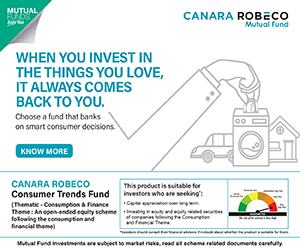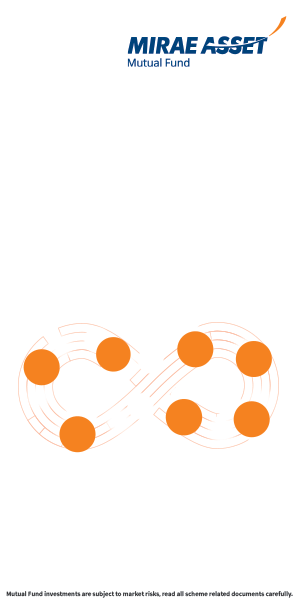In the long run ESG funds tends to have potential to generate higher wealth along with lower volatility
BFSI Industry Interview

Mr. Srivastava has more than 10 years of experience in the field of financial services and stock markets. He has been associated with Mirae Asset Investment Managers (India) Private Limited from Sep 2018 till date with overall responsibilities of leading passive investment products.
Please explain what ESG for layman investors. How are ESG principles applied to investments?
In simple terms ESG Investing can be termed as investing in companies that focuses on Planet, People and Profit. It is generally observed that an organization that integrates all 3P's into its core corporate structure, tends to have a competitive advantage over others which in turn translates to sustainable profit in the long run. Generally, an investment analysis for any stock or portfolio is confined within the realms of the financial numbers as stated. ESG investing provides extra non-financial information that helps in identifying long term sustainability of the business over the years.
Further, it is observed that company that has generally strong ESG risk management practices tends to generate competitive advantage over others. This competitive advantage has potential to translate into higher sustainable profits. Further also it is observed that cost of capital for such strong ESG companies tends to relatively lower. Potential to generate higher sustainable profit coupled with lower cost of capital leads to commanding of premium in terms of valuation of such companies. Further the growth prospect of companies will be higher if the probability of occurrence of severe or tail events related to ESG can be minimized.
In terms of application of ESG principles to investment, then each company is evaluated or screened on a lot of holistic and different parameters. For instance, Sustainalytics, one of the global research providers of ESG considers more than 150 parameters, before arriving at its ESG risk rating. It is important to also consider how well is the company managing its ESG risk relative to its peer in the sector it operates. Companies operating in Oil and Gas sector will always be exposed to higher ESG risk than let’s say a company operating in technology sector. But if that company in Oil & Gas is managing its risk relatively better than its peer, than we can reasonably assume it has well integrated ESG practice. To name some of the factors that are used in ESG evaluation are:
- How well is the company managing its carbon emission (both direct and indirect)
- What are the steps taken by company to manage or effectively minimize its impact on environment?
- What is the labour standard in an organization? How well company treats it stake holders?
- How well company is managing its product and services from ESG impact point of view? What is the policy and performance pertaining to governance and issues like whistle blower, sexual harassment, gender diversity etc.?
Apart from this corporate governance is at heart of evaluation of all the companies. Because at the end of the day, if governance and management is poor than the investor will suffer irrespective of the sector in which companies operates.
ESG funds are gaining in popularity in developed markets where there is higher awareness about the environment. Are ESG factors relevant in a market like India?
In the context of India, we have seen time and again how big corporates have failed and their investors have lost their substantial wealth due to poor governance issues, product issues such as adulterations in drugs, environmental damages leading to closure of plant, failure of banks internal mechanism to detect fraud etc. and more importantly investors or provider of the capital have penalized such companies. As a result of which Indian companies have started taking cognizance of material ESG issues. They are aware that all the stakeholders will be closely monitoring any development related to ESG. Also, capital market regulator SEBI has pushed it from its end that all top 500 companies are require to make Business Responsibility Report (BRR). Partly driven by regulators and party driven by desire to see action from the stakeholders has resulted incorporation of ESG practices by India Inc. Various Indian corporates have integrated United Nation Sustainable Development Goals (SDGs) as part of its core corporate philosophy. Investors have started asking companies to incorporate ESG and companies are responding to the investors call. As a result of which we are witnessing surge in the theme even in India from both investment and corporate side.
There are concerns among some investors that focus on ESG may compromise returns. What are your views?
In ESG Investing, investor tries to achieve dual objective with emphasis on both i.e. generating financial return and on generating positive social and environmental impact.
As far as performance related issue is concerned, empirical studies have documented otherwise. Morgan Stanley which analysed more than 10,000 open ended mutual funds found out that investing in sustainability has usually met, and often exceeded, the performance of comparable traditional investments. This is on both an absolute and a risk-adjusted basis, across asset classes and over time. Morningstar in its latest study on performance of sustainable funds domiciled in Europe, which is the largest market for sustainable investing, found out that across all categories at least 50% of sustainable funds outperformed traditional funds.
In India's context too, since its inception from Jan 2014 to April 2021, Nifty100 ESG Sector Index has generated an annualized return of 14.9% with an annualized volatility of 16.80%. During the same period Nifty100 Index has given a lower return of 14% with higher annualized volatility of 17.2%. While the past performance cannot be referred as guide for future performance, but it exhibits that incorporating ESG factors has potential to improve risk-return reward.
In fact, these evidences indicate that ESG theme portfolio can form part of your core portfolio as such portfolio has potential to create wealth with lower risk in the long run. Hence by investing in an ESG portfolio you are not only contributing to a better tomorrow by incentivizing companies to incorporate ESG practices but you are doing so with the possibility of generating higher wealth with lower risk. ESG is hence a noble investment strategy that scores on performance and morals.
You launched Mirae Asset ESG Sector Leaders ETF and Mirae Asset ESG Sector Leaders Fund of Fund last year. Why did you choose passive strategy instead of active?
We need to understand that ESG data are by and large qualitative in nature and adapting all this information requires a domain expertise which is significantly different than evaluating companies based on financial parameters. This is where we need help of global ESG research provider such as Sustainalytics. These people specialize in understanding and assessing the impact of an ESG event and help in providing objective analysis of material ESG risk to which companies are exposed. They consider more than 150 parameters, before arriving at its ESG risk rating. Nifty100 ESG Sector Leader Index is based on ESG risk rating provided by Sustainalytics and index is managed by NSE.
ESG ETFs are based on index that are constructed based on clearly defined rule which are very specific, leaving no room for ambiguity. Stock selection is based on the ESG research done by the global leaders in ESG research, who have immense expertise on the subject. Rule based investing approach of an ETF means that investor knows exactly what the fund will and will not invest in, which is very critical in case of theme such as ESG. An active fund manager can take dynamic call, but it also brings a lot of subjectivity in the process of selecting companies based on ESG performance that gets minimized in case of ETFs. Also, as highlighted previously the index itself is not static but dynamic, where it is being reviewed on an on-going basis to keeps tab on ESG performance on a continuous basis and any major or severe controversary.
Please describe the salient features of Mirae Asset ESG Sector Leaders Fund of Fund including the benchmark index, which your underlying ETF is based on.
Mirae Asset ESG Sector Leaders Fund of Fund invests in Mirae Asset ESG Sector Leader ETF which is a passive product that aims to track closely Nifty100 ESG Sector Leader Index.
Firstly, the universe is Nifty100 i.e. in essence large-caps. Among the 100 companies, companies engaged in the business of ethically and socially questionable business such as alcohol, tobacco, weapons etc. are excluded. Further, any company facing severe controversy as defined by Sustainalytics, is also excluded. Also, the companies who have poor ESG risk rating are excluded. Till this step, exclusion is based on absolute basis. What Nifty100 ESG Sector Leader Index does differently is that it goes one step ahead and checks how is the company managing its ESG Risk in relation to its global industry peers and their risk practices. Only those companies who are above average compared to their peers are shortlisted. This is basically a relative evaluation, where the Nifty100 ESG Sector leader index recognises that companies operating in different sector are exposed to different type of ESG risk and each company operating in different sector manage their ESG risk distinctly. So, it's important to see how a company has fared relative to its peer in which it operates. In final step, top 75% companies are chosen across sectors to ensure representation of best ESG companies from each sector and achieve portfolio diversification across large cap segment. Stock weights are capped at 10%. Overall, we are able to see portfolio which is mainly true to label and sector agnostic.
The Nifty100 ESG sector leader index is reviewed on semi-annual basis in June and December every year. The review will assess whether existing constituents of the index continues to fulfil and adhere to ESG norms, if not than such stocks in the index will be replaced by other ESG compliant stocks. In addition to scheduled rebalancing, on an ongoing basis each constituent will be kept under check with regards to severe controversary and will be excluded as soon as possible in event of occurrence of major controversary.
What are the things that retail investors should look for when investing in ESG funds? What is the minimum recommended investment tenure for your fund? What is your advice for investors?
Retail investor should first understand the potential benefit and the checks that comes with or is associated with an ESG Funds before investing
The potential appeal of ESG funds are:
- The opportunity to align your investment with your values
- In the long run ESG funds tends to have potential to generate higher wealth along with lower volatility
- Incentivizes the companies to focus not only on profit but also on planet and people.
- Companies with strong ESG practice tends to have lower cost of capital coupled with higher profitability. This generally leads to premium valuation and competitive advantage over the peers.
- ESG factors can be leading indicator that may highlight any material risk that may not be evident by financial analysis Points which investors should keep in mind before investing in an ESG fund is that an ESG fund can be managed in different ways. Some may just exclude controversial companies whereas others may also look at absolute ESG performance or ESG performance w.r.t peers. The ESG assessment may be based on a robust model or can involve subjective judgement of the fund management team. The way ESG fund is managed will lead to the portfolio construction. An investor who is selecting an ESG fund, should assess and understand if the concerned fund philosophy meets his objective of ESG investment.
With respect to investment horizon, the investor in ESG fund should invest from a long-term point of view, in order to gain the benefit form potential superior risk adjusted performance of ESG compliant portfolio.
Mutual fund investments are subject to market risks, read all scheme-related documents carefully.
Recent Interviews
-
In conversation with Mr Vaibhav Shah Head Products: Business Strategy & International Business Mirae Asset Mutual Fund India
Apr 18, 2025
-
In conversation with Mr Kaustubh Sule Senior Fund Manager Fixed Income with Groww Mutual Fund
Apr 18, 2025
-
In conversation with Mr Abhishek Tiwari Chief Business Officer of PGIM India Mutual Fund
Apr 5, 2025
-
In Conversation with Mr Akhil Chaturvedi Executive Director & Chief Business Officer with Motilal Oswal Mutual Fund
Mar 26, 2025
-
In conversation with Mr Rohit Seksaria Fund Manager Equity with Sundaram Mutual Fund
Mar 7, 2025
Fund News
-
Axis Mutual Fund joins ONDC Network to Expand Access to Mutual Fund Investments
Apr 18, 2025 by Axis Mutual Fund
-
Nippon India Mutual Fund launches Nippon India Nifty 500 Quality 50 Index Fund
Apr 18, 2025 by Advisorkhoj Team
-
Nippon India Mutual Fund launches Nippon India Nifty 500 Low Volatility 50 Index Fund
Apr 18, 2025 by Advisorkhoj Team
-
RBI Monetary Policy: RBI changes policy stance and lowers rate
Apr 9, 2025 by Axis Mutual Fund
-
Kotak Mahindra Mutual Fund launches Kotak Nifty Top 10 Equal Weight Index Fund
Apr 7, 2025 by Advisorkhoj Team




